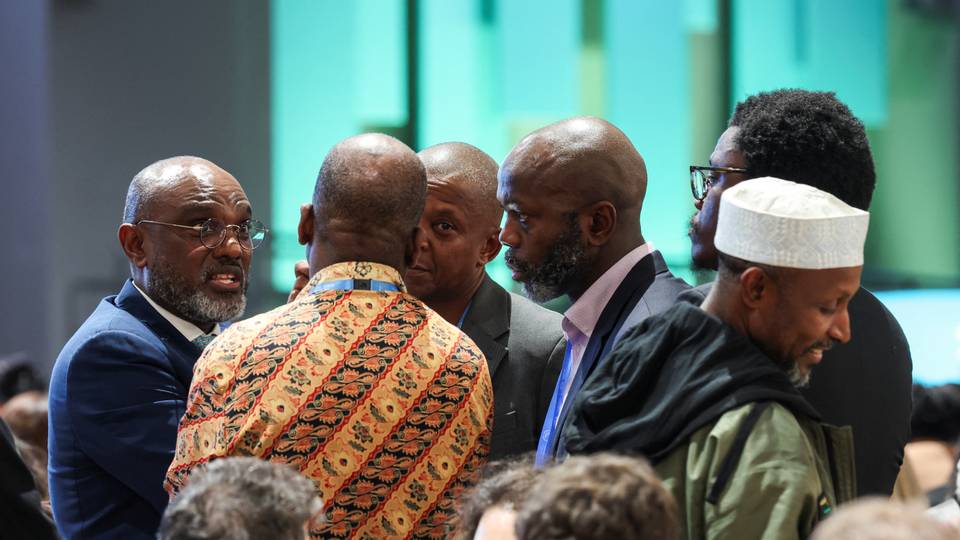The African Negotiators Group stated that the 300 billion dollar climate financing agreement reached at the UN talks in Azerbaijan is “too little and too late.”
African countries criticized the $300 billion climate finance agreement reached at the UN talks in Azerbaijan, calling the figure “too little and too late.”
Almost 200 countries, after two weeks of exhausting negotiations and sleepless nights, discussed the controversial financial agreement early on Sunday morning in a sports stadium in Azerbaijan.
The African Negotiators Group stated that the $300 billion climate finance deal, agreed upon during the UN talks, was “far too little and too late” for the continent.
The group’s Kenyan president, Ali Muhammed, expressed deep disappointment during his speech at the COP29 conference in Azerbaijan, stating, “We are extremely disappointed by the lack of progress on critical issues for Africa.”
“Africa has sounded the alarm about the insufficiency of climate finance and will continue to do so.”
‘Extremely Disappointed’
The final deal stipulates that developed countries will pay at least $300 billion annually by 2035 to help developing countries green their economies and prepare for more severe disasters.
This had already been set at $100 billion under an earlier commitment, but it had been criticized as inadequate by developing countries.
The most polluting countries had demanded at least $600 billion.
Jiwoh Abdulai, Climate Minister of Sierra Leone, one of the world’s poorest countries, said this showed a “lack of goodwill” from developed countries, including the US, Japan, and the EU.
“We are extremely disappointed by the results,” he said.
Tina Stege, climate envoy for the Marshall Islands, a small island nation threatened by rising sea levels, said she would return home with “only a small portion” of what she fought for.
‘This is a Betrayal’
“It’s not enough, but it’s a start,” she added.
The Alliance of Small Island States, Least Developed Countries, and the African Negotiators Group, all influential blocs of developing countries, expressed their disappointment at the deal.
Mohamed Adow, director of Power Shift Africa in Kenya, said, “This COP has been a disaster for the developing world.”
“This is a betrayal of the rich countries that claim to take climate change seriously, both for people and the planet.”
India also rejected the recently agreed “very poor” dollar figure, calling it “an insufficient amount,” said India’s delegate, Chandni Raina.
Sleepless Night
“This document is more than just an optical illusion. In our view, it won’t address the scale of the challenge we are facing,” she added.
Countries had long struggled to reconcile differences over how much the historically responsible rich nations should contribute to help the poorer, least responsible but most affected countries cope with the rapidly warming planet.
UN Climate Change Chief Simon Stiell acknowledged that the deal was incomplete but said that “no one got everything they wanted” in the negotiations in Baku, on the Caspian Sea.
“It’s not time for a victory lap,” he said.
UN Secretary-General Antonio Guterres expressed his disappointment, stating that he “hoped for a more ambitious outcome” and urged governments to see this as a foundation on which to build.
Developed countries, after a sleepless night of intense shuttle diplomacy, only proposed the $300 billion figure on Saturday, after rejecting an earlier offer.
At the Brink of Collapse
In the final hours before the agreement, bleary-eyed diplomats gathered in anxious groups, still reviewing the final sentence of the deal in the plenary hall.
UK Energy Minister Ed Miliband celebrated the signing of a “critical last-minute deal for climate.”
At times, the talks almost collapsed; developing countries walked out and threatened to leave the meeting if rich countries did not increase their contributions.
In the end, despite the deal being poor, none stood in the way of reaching an agreement.
EU Climate Envoy Wopke Hoekstra said the COP29 would be “remembered as the beginning of a new era for climate finance.”












